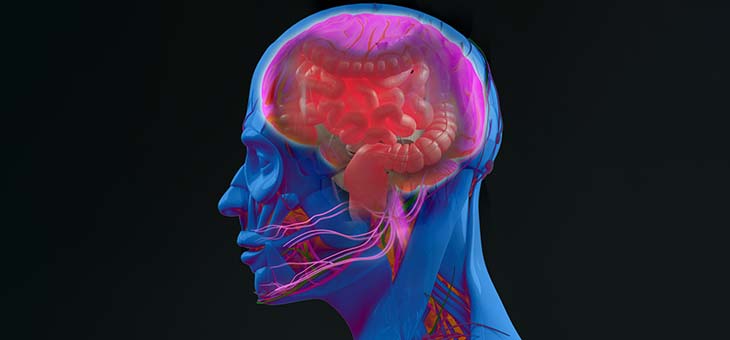A disease affecting one in 250 Australians could also lead to a six-fold increased risk of Alzheimer’s – and an overall doubling in the risk of all types of dementia.
Inflammatory bowel disease (IBD) – not to be confused with the more common inflammatory bowel syndrome (IBS) – is the collective term for Crohn’s disease and ulcerative colitis.
IBD is a chronic and largely hidden disease that affects around one in 250 people. More than 75,000 Australians have Crohn’s disease or ulcerative colitis, with that number predicted to rise to 100,000 within the decade. Australia has one of the highest rates of prevalence and incidence in the world and each year more and more young people are being diagnosed.
Researchers in Taiwan exploring the ‘gut-brain axis’ – the link between gut health and brain function – have found that dementia was diagnosed seven years earlier in people with IBD than in those without the condition, suggesting that IBD may hasten the onset of dementia.
The gut-brain axis is a complex communication system between the gut and its resident bacteria – the microbiome – and the central nervous system.
Earlier studies found that IBD might contribute to the development of Parkinson’s disease and “indicated chronic inflammation and an imbalance in gut bacteria as potential contributors to cognitive decline.”
Participants in this study with IBD were diagnosed with dementia, on average, seven years earlier than those without IBD, and people with IBD were more than twice as likely to develop dementia as those without – even after accounting for potentially influential factors, including age and underlying conditions.
Those with IBD were six times more likely to develop Alzheimer’s than those without IBD.
The risk of dementia “seemed to be associated with increasing length of time a person had had IBD”, said the British Medical Journal (BMJ).
While the researchers couldn’t establish cause and effect and had limited information about other potentially influential lifestyle factors, such as diet and exercise, or assess the impact of anti-inflammatory drugs prescribed, they concluded that those who have IBD “might benefit from education and increased clinical vigilance,” to stave off cognitive decline and improve their quality of life.
IBD is a complex inflammatory condition that still has no clear cause.
“It is thought to develop from an impaired immune response to changes in the gut microbiome,” said BMJ.
There is also no clear link between the more common IBS leading to IBD, but when IBS patients “develop mucosal inflammation and experience changes in the composition of the microbiome, they’re said to be pre-IBD” – or may be developing some condition of the immune system.
University of California researchers found that a high-fat diet combined with the use of antibiotics could increase the risk for having pre-IBD 8.6 times compared with those on a low-fat diet and with no history of antibiotic use.
Researchers suggest the best way to avoid IBD and potentially reduce your risk of Alzheimer’s is to steer clear of unnecessary antibiotic use, consume a low-fat diet and exercise regularly.
Do you have IBS or IBD? What do you do to manage these conditions?
If you enjoy our content, don’t keep it to yourself. Share our free eNews with your friends and encourage them to sign up.
Related articles:
https://www.yourlifechoices.com.au/health/wellbeing/five-ways-to-improve-gut-health
https://www.yourlifechoices.com.au/health/wellbeing/food-to-boost-gut-health
https://www.yourlifechoices.com.au/health/your-health/hardest-diseases-to-diagnose

